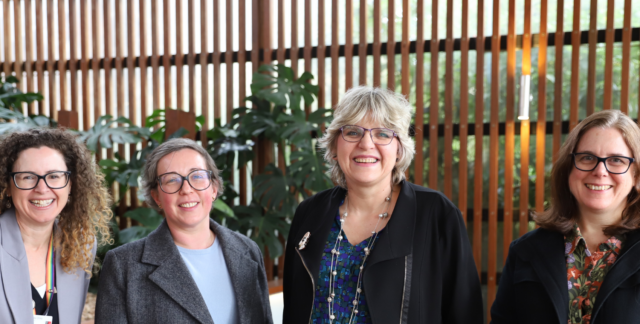RMIT University has received its second SAGE Cygnet in recognition of its work to remove barriers to the participation and career fulfilment for parents and carers across the organisation.
In recent years the University has implemented a range of initiatives to focused on three core areas: culture of care, entitlements and ways of working, and career progression, to support parents and carers to have well-rounded and impactful careers while balancing their other commitments.
Professor Kay Latham, Dean of STEMM Diversity and Inclusion said she couldn’t be more delighted to have received the second Cygnet award, marking the University’s progression towards its silver Athena Swan accreditation.
“We’ve had a focussed and concerted effort on removing barriers and supporting parents and carers within our RMIT community, and this second Cygnet is wonderful recognition of our ongoing commitment to being an inclusive, values-led employer,” she said.
SAGE CEO Dr Janin Bredehoeft congratulated RMIT on its achievement and said the award recognised the University’s deep action to build a workplace that values parents and carers.
“By offering more flexible working arrangements, improving leave entitlements and making promotions more accommodating of caring responsibilities, they’re embedding a culture of care. That’s had a powerful impact for all parents and carers, with a notable improvement for those with a disability,” she said.
“RMIT has shown that it’s possible to hand parents and carers more control over their workloads while not damaging their opportunities for career progression. Congratulations to the team that led this work, and to everyone in the university who embraced the change.”
Creating a culture of care
To build a strong culture of care and to enable staff at all levels to bring their whole selves to work and achieve better work-life balance, RMIT has embraced flexible working and invested heavily in staff wellbeing. This began in 2018 but accelerated through the COVID-19 pandemic and was supported by the development of the University’s Parent and Carer Inclusion strategy.
As a result of these initiatives in 2021, 5,000 staff took 23,200+ days of additional Wellbeing Leave and the University introduced ‘slowdown weeks’ to encourage staff to take time away from work to rest and recharge.
A range of new support and resilience programs were also introduced for parents and carers including Keep in Touch for parents on leave and Managing the Transition to and from Parental Leave.
Entitlements and ways of working
RMIT has also reduced the gendered impacts of career interruptions by increasing leave entitlements (parental leave, parental partner leave) and flexible and hybrid working to encourage uptake by a more diverse staff cohort. Following a push in 2020, men have increasingly used formal flexibility, and as a result the gender gap in flexible working has reduced by almost 50 per cent since 2019.
The greatest improvements have been reported amongst staff with a disability, with 81 percent stating they have the flexibility they need to manage work and other commitments, an uplift of 36% since 2017.
Career progression
RMIT has implemented changes to the Academic Promotion system to enable candidates to present their achievements relative to the opportunities that have been available to them. As a result, there has been an increase in successful applications from a more diverse cohort of academics. For example, in the 2022 round of academic promotions, the success rate was higher for applicants with carer responsibilities and dependent children than the overall average.
In 2021 RMIT also established the Career Reignite program, to reduce the impact of career interruptions or barriers to opportunities for researchers.
About the award
This SAGE Cygnet Award follows the first Cygnet achieved by RMIT in January 2023, and the Athena SWAN Bronze Accreditation awarded in February 2020.
Through the SAGE accreditation pathway, institutions apply for Cygnet Awards by reporting on the actions they have implemented and the outcomes, impact, and learnings as a result of those actions. This process allows institutions to review and set clear future actions to address specific barriers for the equity, diversity and inclusion.
How did they do it?
Read all about RMIT’s action planning, implementation and impact in their Cygnet Award application.



